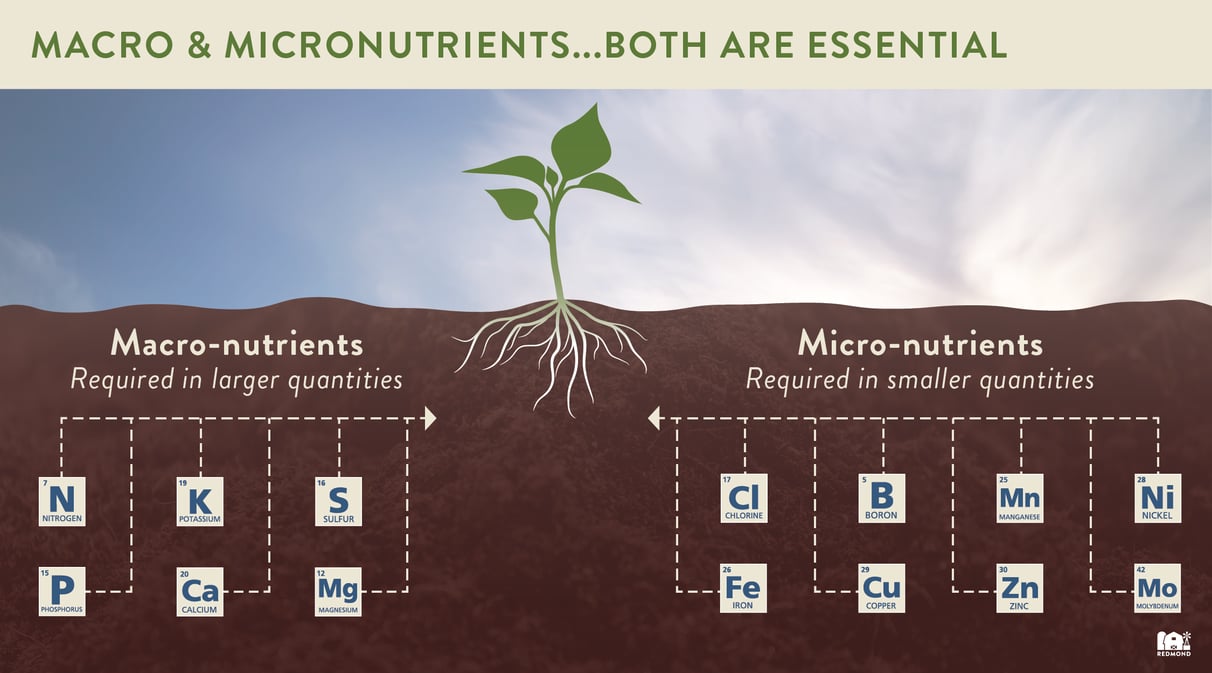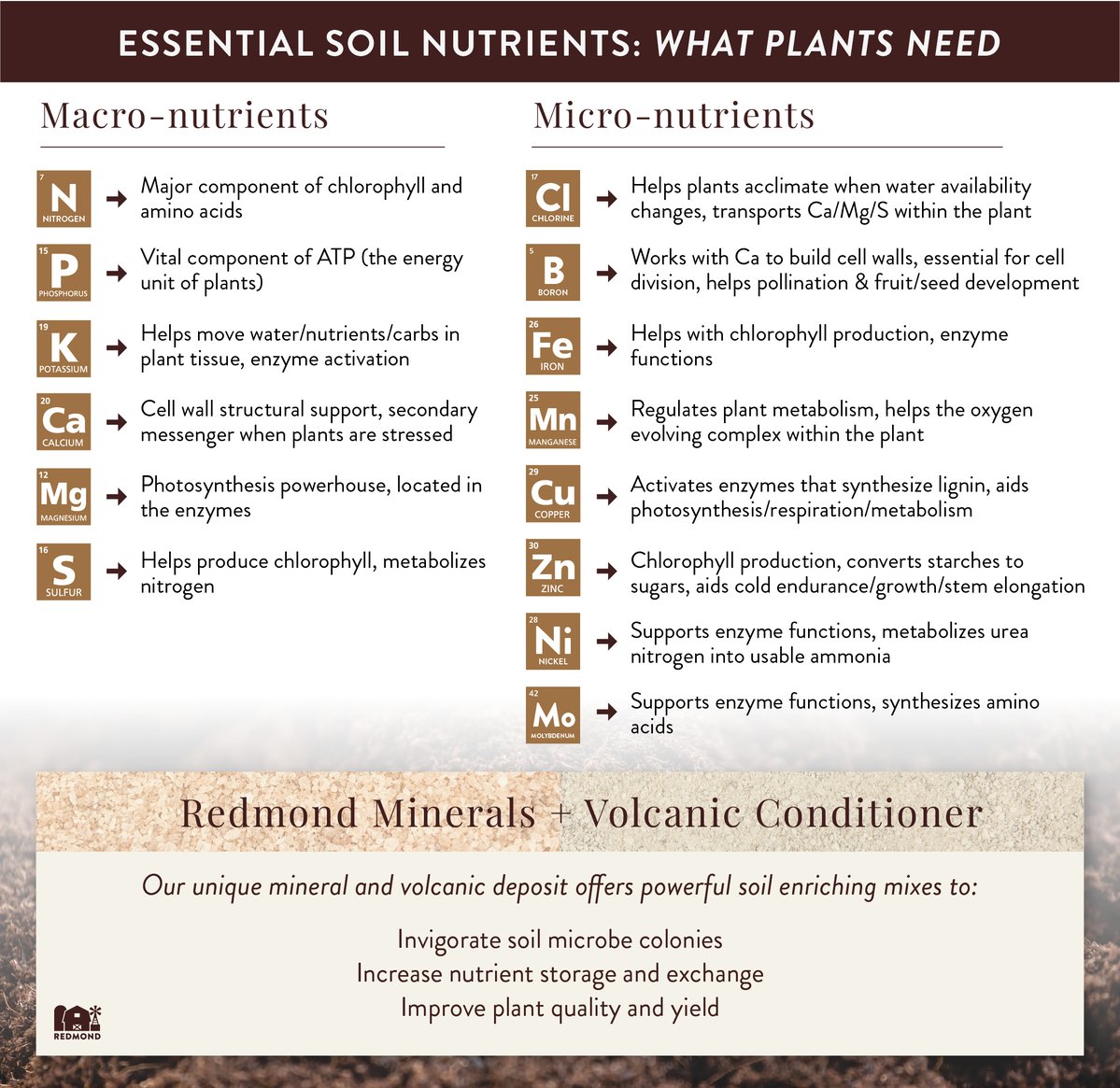Essential Minerals/Nutrients For Plants
According to the National Institute of Health, plants require at least 14 minerals for their nutrition that are generally obtained from the soil. These minerals are broken down into 2 groups: macro-minerals and micro-minerals. Now, don’t let the prefixes trick you into thinking 1 group is more important than the other. Macro-minerals are simply required in larger amounts, while micro-minerals are just as critical, but only needed in smaller amounts.

Essential Minerals/Nutrients
Macro-nutrients
- Nitrogen: A major component of chlorophyll the plant uses to photosynthesize its own food. It is also a major amino acid component for the building of proteins.
- Phosphorus: An important part of ATP (Adeno triphosphate) which is the energy unit of the biological processes within a plant’s cells.
- Potassium: Helps with the movement of water/carbohydrates/other nutrients throughout the plant tissue. Activates enzymes in the plant that control protein, starch, and ATP production.
- Calcium: Strengthens plant cell wall support and acts as a secondary messenger when a plant becomes physically or biochemically stressed.
- Magnesium: Powers photosynthesis within the chlorophyll molecule.
- Sulphur: Needed to help plants produce chlorophyll and metabolize nitrogen.
Micro-nutrients
- Chlorine: Helps the plant make adjustments to osmosis as water availability changes. Also supports the transportation of macronutrients (calcium, magnesium, and potassium) within the plant.
- Boron: Aids calcium in building cell walls and creating new plant cells. Also helps with reproductive growth like fruit/seed development and pollination.
- Iron: Helps chlorophyll production.
- Manganese: Regulates plant growth, metabolism, and sustains the oxygen-evolving complex (OEC) which helps the plant break down and use water.
- Copper: Aids photosynthesis, plant metabolism, and respiration. Also activates enzymes to produce lignin.
- Zinc: Helps chlorophyll and carbohydrate production, increases cold hardiness, forms auxins (which help stems elongate and regulate growth).
- Nickel: Enzyme component that helps metabolize urea nitrogen into usable ammonia.
- Molybdenum: Important component for enzymes that help synthesize amino acids and process nitrogen.
Beneficial Minerals/Nutrients
In addition, there are also some beneficial minerals that can enhance a plant’s hardiness, increase nutrient density, and further increase growth.
- Sodium: In trace quantities, aids plant metabolism and chlorophyll production.
- Selenium: An antioxidant that helps plants cope with stress and enhances other antioxidant enzymes.
- Cobalt: In trace quantities, forms a number of enzymes and increases drought tolerance in seeds.
- Silicon: In certain plants, it improves drought tolerance, delays wilting during water scarcity, and can enhance a plant’s ability to resist toxins.
- Aluminum: Promotes nutrient uptake and stimulates root growth.
A Word About Soil Testing
Both natural and manmade forces are continuously leaching these minerals away from your soil. Some of these minerals may already be present in your soil, but not necessarily in the quantities your plants need. To eliminate guesswork, it is helpful to get your soil tested before adding amendments or supplements to your soil. Redmond Soil Test Kit offers fast and accurate results to help you know before you grow!
Essential Plant Nutrition From Redmond Minerals
Redmond agriculture was started by farmers over 50 years ago and those down-to-earth origins created the foundation we continue to use today. Our uniquely mineral balanced soil products are harvested directly from an ancient mineral sea bed and volcanic deposit, deep in the heart of farm country in central Utah.
 We know that too many fertilizer programs today focus heavily on NPK (Nitrogen, Phosphorus, and Potassium) while neglecting these other essential minerals. Adopting a well-rounded and complete soil mineral program will produce both immediate and long lasting rewards for any growing operation. Click to learn more about how Redmond minerals soil program has helped farms and gardens across the country increase their yields and produce nutrient dense plants that benefit us all. Give us a call at
We know that too many fertilizer programs today focus heavily on NPK (Nitrogen, Phosphorus, and Potassium) while neglecting these other essential minerals. Adopting a well-rounded and complete soil mineral program will produce both immediate and long lasting rewards for any growing operation. Click to learn more about how Redmond minerals soil program has helped farms and gardens across the country increase their yields and produce nutrient dense plants that benefit us all. Give us a call at  today!
today!
© 2023 Redmond Minerals Inc.
